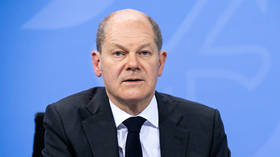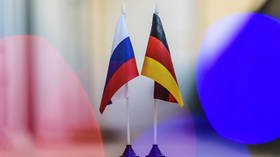New German chancellor to meet Putin, wants 'fresh start' – media

German Chancellor Olaf Scholz is hoping to turn a page in relations with Moscow, and expects to meet with his Russian counterpart Vladimir Putin by the end of the month, according to a report from Berlin's top tabloid.
On Monday, Bild claimed that Scholz sees relations with Moscow as a top-tier foreign affairs priority in spite of calls from some members of his governing coalition for a more confrontational approach to Russia. The newspaper said that the 63-year-old is aiming for a "qualified fresh start."
However, Berlin has officially yet to confirm any top-level meeting of this type, with the German Embassy in Moscow also unable to verify the report. What is known, however, is that the chancellor’s foreign policy adviser will meet his Russian and French counterparts this week.
Scholz’s reported attempts at a new détente with Moscow may prove unpopular with his coalition partners, particularly the Green party, which is strongly pro-US/NATO and hostile to Russia.
Foreign Minister Annalena Baerbock and Economy Minister Robert Habeck are known to want Berlin to adopt a more hardline anti-Russian stance.
Scholz, a Social Democrat, who took office on December 8, had his first phone call with the Russian president on December 21. Russia’s proposals for security guarantees in Europe loomed large during the conversation. Putin said that Moscow wants legally binding documents ensuring that NATO will not expand further to the east, including into Ukraine.
A number of Western leaders have already spoken out against Russia’s proposals, while Moscow has made it clear it will respond proportionately in the absence of an agreement.
On January 10, representatives of Russia and the US will meet in Geneva, to discuss the security guarantees. Two days later, the NATO-Russia Council will convene in Brussels, followed by a meeting of the OSCE Permanent Council in Vienna on January 13.
The events come amid rising tensions over Ukraine, with Western media and politicians peddling claims of an imminent Russian invasion for close to two months now. Moscow has repeatedly denied having plans to attack its neighbor, and insists that the military movements cited by the West have been limited to Russian territory.













